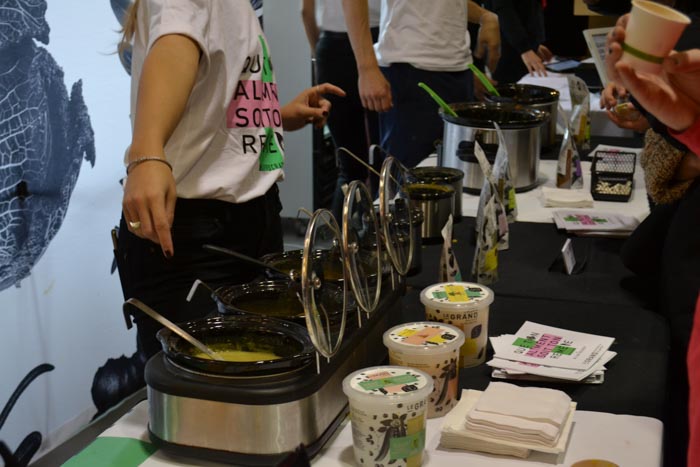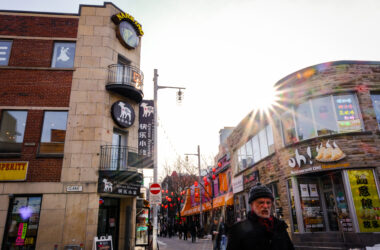From Nov. 4 to 5, this year’s vegan festival ran as an ode to the emerging success of the vegan movement in Montreal. The city’s first vegan festival debuted in 2014, and it has come far since then. Among the festival’s stacked list of guest appearances was Chris Cooney, a popular YouTuber with a cooking channel called Vegan Zombie; Samantha Turnbull, who runs the fuss-free vegan recipe blog It Doesn’t Taste Like Chicken; and Syl Ko, an intersectional vegan activist. Ultimately, all of these speakers share the same goal of promoting an ethical, sustainable lifestyle free of consuming animal products.
Walking into Bonsecours Market, surrounded by crowds of vegans, vegetarians, and the vegan-curious, I was overwhelmed by all the excitement. I had recently been reflecting on how to make ethical choices in all aspects of my life, including my food habits. Though I had little idea of what to expect, I went into the festival hoping to learn more about veganism, meet people who are interested in the lifestyle, and eat some great food in the process.
The food
The festival was set up with a stage on the first floor where the speakers delivered their talks, short films were presented, and demonstrations were held. The other floors were filled with tables, where local businesses showcased their products and offered free samples for tasting. Not knowing where to go first, we started to eat.
First came cheese. I’ve always been a bit apprehensive of vegan cheeses, but I was pleasantly surprised by a few stand-out products this weekend. Among them was ‘Gusta’, a local line of artisan vegan cheeses and meats. Their raw cheeses are firm, but melt easy, and taste great on their own. A representative I spoke to recommended I purée sweet potato with their cheddar cheese, making a creamy combo to be melted onto noodle to make a super tasty and vegan mac n cheese. The challenge with many vegan cheeses is knowing how to dress them up to get the taste you want. You can do this by experimenting with spices, and other food combinations that you may not have considered otherwise—the internet is a great tool for this! Lesson learned: experimentation is key, and not all cheeses are created equal.
As we moved through the festival, we tasted vegan food samples, each one more unique than the ones before it. The most surprising part of the day, though, was probably my encounter with a super-sneaky shiitake mushroom. One of my friends–who hates mushrooms, for context–picked up a vegan burger sample from Copper Branch, not realizing it was 100 per cent shredded shiitake mushroom. Nonetheless, he loved the burger! The real trickery at play was the teriyaki sauce used to marinate the mushroom mix, totally covering up any and all fungi flavours. If you’re interested in trying this out, Copper Branch is just steps away from McGill. Alternatively, you can make your own super tasty burger at home.
The message
Attendees at the festival heard from a range of insightful speakers, many of the whom are involved with animal rights groups, among other organizations committed to advocating for both animals and the environment. One of the speakers, Syl Ko, co-authored a book with her sister titled Aphro-sim: Essays on Pop Culture, Feminism, and Black Veganism from Two Sisters. Aphro-ism began as a blog, which the sisters used as a platform to discuss decolonial feminism, veganism, animals, and anti-racism. After delivering a short talk about her work, Ko discussed how ideas about racism transcend into humans’ exploitation of animals.
“[We] already know that there’s a social human-animal binary, or stuff like Donald Trump calling Latinos ‘animals’ wouldn’t make sense to us,” Ko said. “When Donald Trump is talking like that, he’s not being a biologist […] he’s using ‘animal’ in a very social way.”
Black veganism is a theoretical position which encourages consumers to think about animal oppression as an intersectional issue, rooted in social and racial issues, and not just a species divide. From this perspective, we can re-frame animal rights activism without using Eurocentric thinking.
“[Animal oppression, social, and racial issues are] really connected and we’re not seeing [the connection] because we’re using theories that kind of come from the same 10 white people over and over again,” Ko said. “What would happen if we just kind of used somebody else? You know, that’s sort of what we’re doing. [We] have a different way to explain and describe animal oppression and it has nothing to do with the fact that they are a different species.”
For Ko, making the connection between veganism and societal issues is essential. While many vegan brands advertise their products as “cruelty-free,” this trademark negates the existence of human cruelty. Unfair wages and poor working conditions are among the many shapes and forms of human cruelty that persist in the creation of cruelty-free products. Ko reminds us to think about the social issues embedded within the vegan movement which we may not consider otherwise.
If I had to sum up my experience at the festival in a few words, I’d say something along the lines of: Delicious food, with a bigger picture. Not only did I take home hot sauce and some cool laptop stickers, but I also left with a different perspective on the vegan movement.








